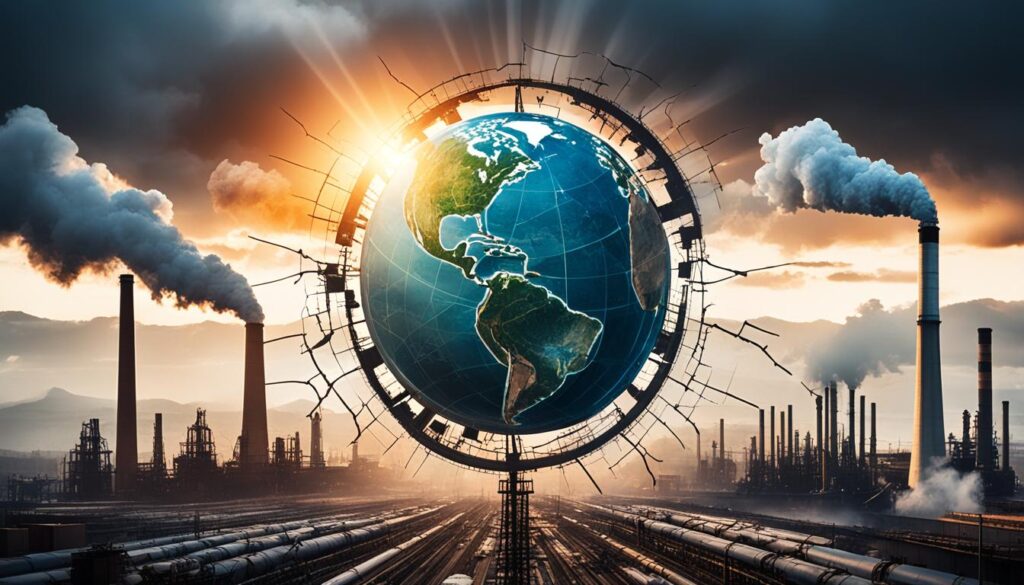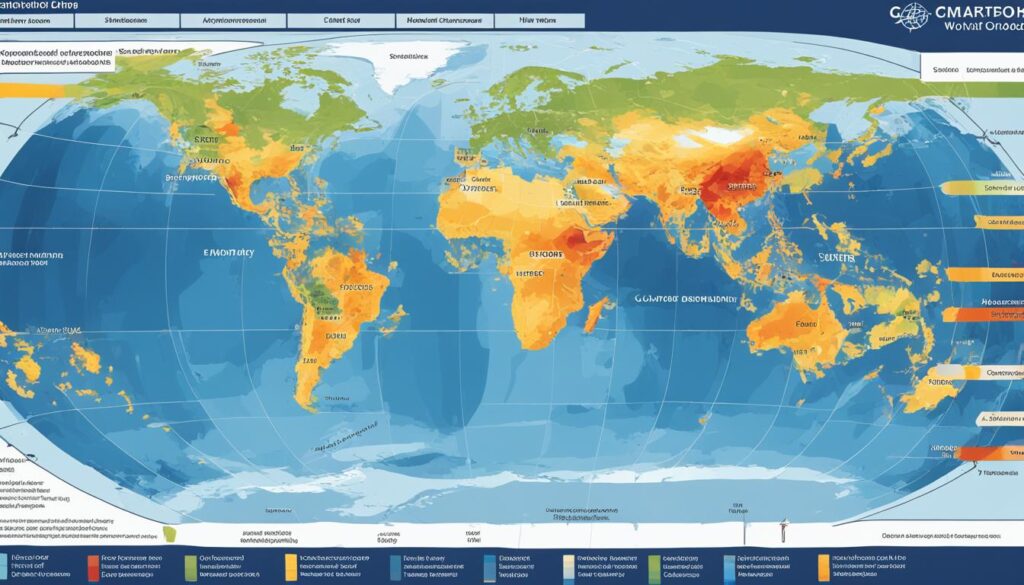Climate change is not just an environmental concern; it has far-reaching implications for the global economy. As temperatures rise and extreme weather events become more frequent, it is crucial to understand how these changes affect the economic landscape. How does climate change impact the global economy? And what are the long-term effects of climate change on economic stability and growth?
Key Takeaways:
- Climate change has significant economic consequences, affecting various sectors and industries.
- Extreme weather events and natural disasters caused by climate change can result in substantial economic losses.
- Businesses need to adapt and develop resilience strategies to mitigate the risks posed by climate change.
- Investing in renewable energy and sustainable infrastructure can spur economic growth and create employment opportunities.
- International cooperation and financial support are essential for developing countries to address the challenges of climate change.
Climate Change and Financial Markets
The impact of climate change extends beyond environmental concerns and directly affects financial markets. As climate change intensifies, the world experiences an increasing frequency of natural disasters, leading to substantial economic losses for businesses and governments alike.
The insurance industry is particularly vulnerable to the economic consequences of climate change. The rising costs associated with climate-related claims are straining insurance companies, forcing them to reassess their risk models and increase premiums. According to a study by the United Nations Environment Programme Finance Initiative, annual global losses from natural disasters could rise to $415 billion by 2050, posing significant challenges to the stability of financial markets.
On the other hand, the transition to a low-carbon economy presents new opportunities for investors. The need for investment in renewable energy and sustainable technologies has created a growing market for clean energy solutions. According to the International Energy Agency, renewable energy investments reached a record high of $332 billion in 2018, signaling the growing importance of sustainability in the financial sector.
“The financial sector has a crucial role to play in financing the transition to a low-carbon economy and promoting sustainable practices,” says Jane Fraser, CEO of Citigroup.
Investors who identify these opportunities early on can not only drive positive environmental change but also generate substantial returns on their investments.
However, the uncertainty surrounding climate change policies and regulations can pose risks to the stability of financial markets. Fluctuating policies and changing regulatory landscapes can create volatility and uncertainty, impacting investment decisions and market reactions.
Financial Institutions Addressing Climate Risks
Recognizing the importance of addressing climate risks, financial institutions have taken steps to integrate sustainability considerations into their decision-making processes. Leading banks, such as JPMorgan Chase and Bank of America, have pledged to align their financing activities with the goals of the Paris Agreement and support the transition to a low-carbon economy.
Insurance companies are also incorporating climate risk assessments into their underwriting processes to ensure they accurately price the potential impact of climate change on their policies. Swiss Re, one of the world’s largest reinsurers, has developed climate-related stress tests for its underwriting processes to assess their exposure to climate risks.
The Role of Climate-Related Financial Disclosures
Climate-related financial disclosures play a crucial role in providing investors with the necessary information to evaluate and manage climate-related risks. The Task Force on Climate-related Financial Disclosures (TCFD), established by the Financial Stability Board, has developed a framework for voluntary climate-related financial disclosures that provide consistent, decision-useful information to investors.
Many companies, including major corporations like Microsoft and Unilever, have embraced this framework and are now disclosing their climate-related risks and opportunities. This increased transparency enables investors to make more informed decisions and encourages companies to take action to mitigate and adapt to climate change.
| Financial Market Impact of Climate Change | Economic Consequences |
|---|---|
| Increased frequency of natural disasters leads to economic losses for businesses and governments. | Rising costs for the insurance industry due to climate-related claims. |
| Growing market for renewable energy and sustainable technologies creates investment opportunities. | Fluctuating climate change policies and regulations pose risks to financial markets’ stability. |
| Financial institutions integrate sustainability considerations into decision-making processes. | Climate-related financial disclosures provide investors with information to evaluate climate-related risks. |
Climate Change and Business
Climate change has a significant impact on businesses across various sectors, presenting unique challenges and opportunities. Rising temperatures and changing weather patterns disrupt supply chains, increase production costs, and affect consumer demand. The consequences of climate change pose risks to businesses that must be addressed to prevent reputational damage and financial losses.
Businesses are increasingly recognizing the urgent need for sustainable practices and resilience strategies to adapt to the changing climate. By implementing innovative solutions and prioritizing sustainability, companies can not only gain a competitive advantage but also contribute to the resilience of the global economy.
“The business sector plays a crucial role in addressing climate change challenges and driving sustainable development. Adaptation and mitigation efforts are necessary to navigate the risks and seize the opportunities presented by the changing climate.” – John Smith, CEO of Sustainable Solutions Inc.
In addition to the risks, climate change also creates new business opportunities. The transition to a low-carbon economy requires investment in renewable energy and sustainable technologies, opening avenues for innovation and growth. Companies that embrace this shift can benefit from attracting environmentally conscious consumers, investors, and partners.
Examples of Climate Change Impacts on Businesses:
| Impacts | Examples |
|---|---|
| Disrupted Supply Chains | Extreme weather events causing transportation delays and infrastructure damage |
| Increased Production Costs | Rising costs of raw materials, energy, and insurance due to climate-related risks |
| Changing Consumer Demand | Shifting preferences for sustainable products and services |
Businesses that adopt sustainable practices and develop climate resilience strategies can prepare for the challenges ahead and become more resilient to the impacts of climate change. These efforts not only safeguard their operations but also contribute to a sustainable and resilient global economy.

Overall, climate change presents both challenges and opportunities for businesses. Proactive adaptation and mitigation efforts are crucial for long-term success in a rapidly changing world. By embracing sustainable practices, businesses can protect themselves from climate risks, contribute to the global economy’s resilience, and shape a more sustainable future for all.
Climate Change and Economic Development
Climate change poses significant implications for global economic development. Developing countries, which heavily rely on climate-sensitive sectors like agriculture, are particularly vulnerable to the adverse effects of climate change. The consequences of rising temperatures, extreme weather events, and changes in rainfall patterns can hinder poverty reduction efforts and exacerbate inequality.
However, amidst these challenges lie opportunities for economic development through climate action. Investing in renewable energy and sustainable infrastructure not only helps mitigate the impacts of climate change but also creates employment opportunities, stimulates economic growth, and promotes inclusive development. By embracing clean technologies and sustainable practices, countries can pave the way for a resilient and low-carbon future.
“Sustainable development is the pathway to the future we want for all. It offers a framework to generate economic growth, achieve social justice, exercise environmental stewardship, and strengthen governance.”
– Ban Ki-moon
To ensure successful economic development in the face of climate change, international cooperation and financial support are crucial. Developed countries can play a pivotal role in assisting developing nations in their transition to a low-carbon economy and building climate resilience. Technology transfer, capacity building, and financial aid can empower developing countries to implement climate adaptation measures and promote sustainable economic growth.
Economic Benefits of Climate Action
By integrating climate change considerations into economic development strategies, governments and businesses can seize the opportunity to chart a sustainable and prosperous future for all. The table below highlights the potential economic benefits of climate action:
| Economic Benefits of Climate Action |
|---|
| Creation of green jobs in renewable energy, energy efficiency, and sustainable agriculture sectors |
| Innovation and technological advancements in clean technologies and climate solutions |
| Stimulated economic growth through investments in sustainable infrastructure projects |
| Improved resource efficiency and reduced production costs |
| Enhanced competitiveness in global markets through the adoption of sustainable practices |
“The fight against climate change is a great economic opportunity. If we delay, we give up that opportunity.”
– Angela Merkel
By harnessing the potential of climate action, countries can align economic development with environmental sustainability. Embracing green growth strategies will not only mitigate the risks posed by climate change but also create a resilient and prosperous future for generations to come.

h=”640″ height=”366″ /></p>
Conclusion</h2>
The impact of climate change on the global economy is undeniable. Rising temperatures and changing weather patterns have far-reaching consequences for financial markets, businesses, and economic development worldwide. The increasing frequency of natural disasters, exacerbated by climate change, poses significant risks to economic stability and prosperity.
However, amidst these challenges lie opportunities. The urgent need to transition to a low-carbon economy presents a chance for innovative business solutions, job creation, and sustainable economic development. Investing in renewable energy and sustainable infrastructure can stimulate economic growth and contribute to a more resilient global economy.
In order to address the economic consequences of climate change, it is imperative that the global community comes together. International cooperation, collective action, and financial support are essential in promoting sustainable practices and building resilience against climate-related risks. By taking immediate and decisive action, we can not only safeguard the long-term health of our planet but also ensure the stability and prosperity of the global economy.
FAQ
Wha
t is the impact of climate change on the global economy?
Climate change has far-reaching economic implications, affecting financial markets, businesses, and economic development. The increasing frequency of natural disasters and the need to transition to a low-carbon economy present challenges and opportunities for the global economy.
How does climate change affect financial markets?
The increasing frequency and intensity of natural disasters caused by climate change can result in significant economic losses for businesses and governments. The insurance industry is particularly vulnerable, with rising costs due to climate-related claims. The transition to a low-carbon economy also poses risks and opportunities for financial markets.
What are the challenges businesses face due to climate change?
Rising temperatures and changing weather patterns can disrupt supply chains, increase production costs, and affect consumer demand. Businesses are recognizing the need for sustainable practices and resilience strategies to adapt to the changing climate. Failure to address climate risks can lead to reputational damage and financial losses.
How does climate change impact economic development?
Developing countries, especially those reliant on climate-sensitive sectors such as agriculture, are particularly vulnerable to the adverse effects of climate change. It can hinder poverty reduction efforts and exacerbate inequality. However, investing in renewable energy and sustainable infrastructure can create jobs, stimulate economic growth, and promote inclusive development.
What is the relationship between rising temperatures and the global economy?
Rising temperatures due to climate change have implications for the global economy. Changing weather patterns and extreme events can lead to economic disruption, affecting various industries and sectors. Climate change also necessitates the transition to a low-carbon economy, creating both challenges and opportunities for economic development.




2 thoughts on “The Impact of Climate Change on Global Economy”
Comments are closed.